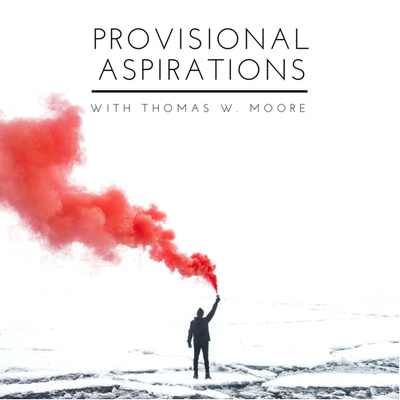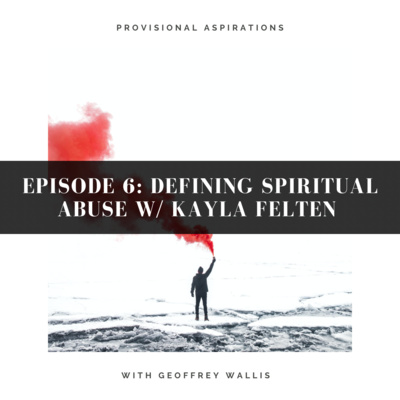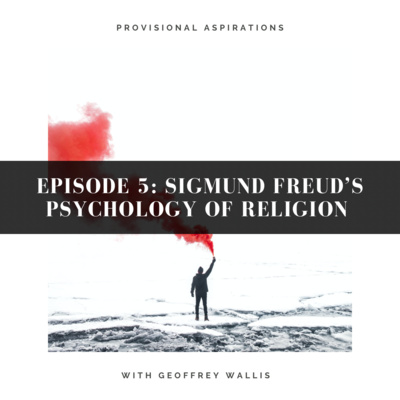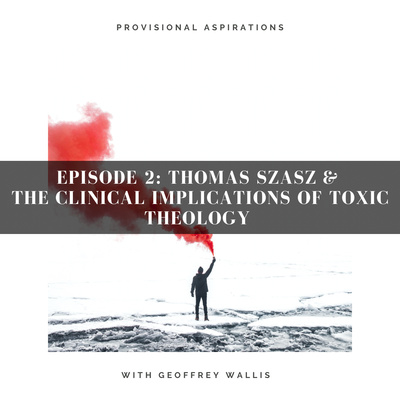
Provisional Aspirations with Thomas W. Moore
By Thomas W. Moore


Lacanian Neuropsychoanalysis - Interview with John Dall'Aglio
In this episode, I have the pleasure of interviewing Duquesne University Clinical Psychology Doctoral Student and author of the book Lacanian Neuropsychoanalysis - Conscious Enjoying Uncertainty, John Dall'Aglio. In our conversation, we discuss how Lacanian concepts can be mapped to contemporary neuroscience findings. Dall'Aglio skillfully weaves together the work of leading thinkers in affective and computational neuroscience, including Jaak Paanksepp, Mark Solms, and Karl Friston, to show how uncertainty can be leveraged in the therapy room.#psychoanalysis #neuropsychoanalysis #neuroscience #psychotherapy #freeenergyprinciple #activeinference #consciousness #jouissance #lacan #freudiantheory #freud #mentalwellness #mentalhealth #clinicalpsychology #psychologyexplained #neurophilosophy #philosophyofmind #philosophy #consciousness

Enjoy Your Enjoyment - Lacanian Jouissance in the Brain
This episode explores jouissance—the paradoxical form of enjoyment that transcends mere pleasure, often intertwining with pain and excess, as conceptualized in Lacanian psychoanalysis. We delve into how contemporary neuroscience intersects with this notion, examining how the brain's reward systems and predictive mechanisms might mirror the complexities of jouissance.Drawing on John Dall'Aglio's recent work, A Lacanian Neuropsychoanalysis: Consciousness Enjoying Uncertainty, we discuss how affect systems can operate like signifiers and how jouissance might be viewed as surplus prediction error, suggesting that the brain is structurally antagonistic . This perspective offers fresh insights into the interplay between the symbolic, imaginary, and real registers in the brain.Join us as we navigate the terrain where subjective experience meets neural processes, considering how the pursuit of pleasure, the repetition of desire, and the inherent tensions within the self contribute to the human experience of enjoyment.#LacanianPsychoanalysis #Jouissance #Neuropsychoanalysis #PredictiveCoding #FreeEnergyPrinciple #JohnDallAglio #ALacanianNeuropsychoanalysis #AffectSystems #StructuralAntagonism #ProvisionalAspirations #neuroscience #psychoanalysis #FEP #philosophy #neurophilosophy #zizek

Spatiotemporal Neuroscience & Mental Health | Dr. Georg Northoff on Consciousness, Time, & Therapy
In this episode of Provisional Aspirations, neuroscientist and psychoanalyst Dr. Georg Northoff joins us to explore how brain activity across space and time shapes our consciousness, sense of self, and mental health. A professor of psychiatry and globally recognized thinker in neuropsychoanalysis, Northoff breaks down the spatio-temporal approach to understanding the mind and its powerful implications for treating depression, anxiety, and schizophrenia.We dive deep into topics like:🧠 The role of resting-state brain activity in perception and cognition🌀 How disruptions in brain time lead to mental disorders🎵 The use of personalized breathing, music therapy, and meditation for emotional regulation🧘♂️ Spatio-temporal psychotherapy and the future of personalized psychiatry🧬 Bridging neuroscience and psychoanalysis through concepts like intra-subjective resonance and defense mechanismsWhether you're a clinician, researcher, or curious mind, this episode offers groundbreaking insights into how we can rethink therapy and diagnostics by aligning with the brain’s natural rhythms.🔔 Subscribe for more conversations at the intersection of neuroscience, philosophy, and mental health.📌
00:00 - Introduction to Dr. Northoff
03:45 - What is Spatio-Temporal Neuroscience?10:02 - The Resting State and the Self
17:12 - Inner vs Outer Time in Mental Disorders
23:44 - Measuring Brain Time
30:15 - Temporal Disruption in Schizophrenia
36:50 - Personalized Therapies: Breathing & Music
45:01 - Neuropsychoanalysis & Defense Mechanisms
51:33 - Temporal Nesting & Early Development
57:28 - Intra-Subjective Resonance in Therapy
01:04:11 - The Future of Spatio-Temporal Psychotherapy
#Neuroscience #MentalHealth #GeorgNorthoff #SpatioTemporalNeuroscience #Consciousness #Depression #Anxiety #Schizophrenia #Psychoanalysis #BrainTime #DefaultModeNetwork #RestingState #MusicTherapy #Meditation #BreathingTherapy #Neuropsychoanalysis #MentalHealthPodcast #TherapistTools #SelfConsciousness #TemporalDynamics #MindAndBrain #ProvisionalAspirations

Zen, Psychoanalysis & The Counselor's Secret Radicalism
In this episode of Provisional Aspirations, we delve into the fascinating intersection of therapy, spirituality, psychoanalysis, and neuroscience. We explore the radical and often overlooked spiritual dimensions of modern therapy practices. How does therapy, often viewed through a secular lens, mirror ancient spiritual traditions? And how does this reshape our understanding of mental health in the 21st century?
Join us as we discuss the ideas of renowned theorist Eric Fromm, whose influential work Zen and Psychoanalysis explores the convergence of Eastern spirituality and Western psychoanalytic thought. We also explore the neuroscience of insight-based decision-making, examining how breakthroughs in understanding the brain can enhance therapeutic practices. Plus, we look at the shift in societal attitudes toward therapy, particularly in the wake of the COVID-19 pandemic, and how this cultural change influences our collective approach to mental well-being.
Whether you're a seasoned therapist or simply curious about the deeper meanings of emotional healing, this episode will challenge conventional views and offer fresh insights into the role of therapy in modern life. Tune in for a deeper dive into the secret radicalism of the counseling profession.
Keywords: Therapy, Psychoanalysis, Zen, Spirituality, Mental Health, Eric Fromm, Zen and Psychoanalysis, Neuroscience, Insight-based Decision-making, Satori, Modern Therapy, Radicalism, Self-Care
Make sure to subscribe to Thomas W. Moore for more thought-provoking discussions on the intersection of psychology, culture, philosophy, and neuroscience.

Season 2 - The New Psychodynamic
In this second season of Provisional Aspirations, we explore the fascinating world of neuropsychodynamics—a field bridging psychoanalysis, neuroscience, and emotional health. Host Thomas W. Moore delves into his journey from leaving the Christian Congregation of Jehovah's Witnesses to his academic path in psychology and psychotherapy.
This season, Thomas brings together thought-provoking perspectives on the integration of philosophy, clinical counseling, and neuropsychology, drawing inspiration from figures like Jaak Panksepp, Mark Solms, and George Northoff. Episodes will examine neuropsychoanalysis, spatiotemporal neuropsychotherapy, and Lacanian theory to unpack the complex relationship between mind, brain, and emotions.
Season 2 offers engaging discussions on postmodernism, philosophical exploration, and practical applications for mental health and healing.
Keywords:neuropsychodynamics, neuropsychoanalysis, psychodynamic theory, psychotherapy, philosophy of mind, emotional health, neuroscience, clinical psychology, neurobiology, mental health healing, personal growth, postmodernism, philosophical exploration, emotional therapy

Stop Whining & Make Yourself Happy - Albert Ellis' Controversial Rational Emotive Behavioral Therapy (REBT)
Albert Ellis was the founder of Rational Emotive Behavioral Therapy (REBT). This episode is based on Ellis' 1999 self-help book How to Make Yourself Happy—and Remarkably Less Disturbably. The book provides the origins of the modality, Ellis’s A-B-C approach to altering limiting thoughts and behaviors, and practical suggestions and case studies demonstrating the efficacy of #REBT. The episode also discusses some of the criticisms of #REBT and Ellis' confrontational style of #psychotherapy. This episode addresses the limits of modern #traumatological approaches to therapy, the overreliance on diagnostic nomenclature in society in the post-mental-health-awareness-movement era, and the common usage of the term #neurodivergent. #psychology #psychotherapy #cognitivehealth #cognitivepsychology #cognitivebehaviouraltherapy #cbt #rebt #philosophy #neuroscience #neurodivergence #reframing #happiness #mentalhealthawareness #mentalhealthcounseling #therapist #therapy

Romance as Rebellion - On Freud On Love
Freud is generally remembered idiosyncratically for his concentration, not on love, but sex. Psychoanalysis, it is quipped, makes everything about sex. I was surprised then, to read Freud refer to the libido, not as a sexual force, but one of love — “Love-force, the libido of psychoanalysis” (p. 30) he calls it.
In all the dimly lit, mahogany and marbled obscurity of the psychoanalytic image, Freud was a lover. And in Group Psychology & The Analysis of the Ego, Freud reminds us of the unique connective power of dyadic heterosexual love.
From the psychoanalytic perspective, when sexual impulses do not find their explicit resolution, they morph into the spectrum of emotional experiences classically associated with love, including yearning for nearness and openness to self-sacrifice. According to Freud, love within the heterosexual union is the combined force of direct sexual release and inhibited (frustrated) sexual energy. When speaking of the above experiences of romance, Freud states:
“All these tendencies are an expression of the same instinctual impulses; in relations between the sexes these impulses force their way toward sexual union, but in other circumstances, they are diverted from this aim or are prevented from reaching it” (Freud, 1960, p.29).

Active Inference & The Emergence of Philosophical Thought
Karl J. Friston is a British neuroscientist known for developing theoretical and statistical models for cognitive processing in the brain. Most notably, Friston’s work has been leveraged to create predictive models for artificial behavior and learning — artificial intelligence (AI). I was introduced to Friston through the work of South African Neuropsychoanalyst Mark Solms and Canadian Neurophilosopher George Northoff. Both neuropsychoanalysts, Northoff and Solms integrate the fundamentals of the Free Energy Principle and Active Inference into their neurobiological approaches to understanding the brain and consciousness. Friston’s two central theories, Active Inference and the Free Energy Principle have earned him wide renown, making him one of the most highly cited scientists ever. This episode also discusses the work being done to map Friston’s central thesis to psychotherapy.

The Antagonism is The Real - Zizek & The Neurophilosophy of Negation
#philosophy #neuroscience #spirituality #neurophilosophy #zizek #jung #psychoanalysis #lacan #psychotherapy #philosophypodcast #podcast #psychology #mentalhealth #ideology #marxism #paradox

The Right Brain & The Dao of Psychotherapy
Schore bemoans a dirth of right hemispheric dominance in our current sociopolitical environment. But, “What the world needs now is right brain dominance, sweet right brain dominance”, feels altogether too reductive.
Therapists tend to forget that their role is inherently one of conflict with higher strata of the socioecology. Society at large — its oppressive infrastructures, hegemonic ideologies, and restrictive norms — are the very elements of the collective social ecology that rub up against an individual’s unique sense of self such that psychological distress occurs.
#psychology #philosophy #psychotherapy #psychoanalysis #mentalhealth #daoism #taoism #neuropsychoanalysis #interpersonalneurobiology

We Are Looking At the Brain All Wrong
If embraced by the field, Northoff’s spatiotemporal approach could drastically alter the way we conceptualize the brain and consciousness, and how they relate, driving scientific discovery in a fresh new direction, one that could avoid both hermeneutic stalemates and the problem of the hard problem of consciousness.
Although #psychoanalysis is not as popular in therapy culture as it once was, neuropsychoanalysis is doing incredible work knitting together the disciplines of neuroscience, philosophy, and psychotherapy into a unified perspective.

The End of Spirituality - Deconstructing Spirituality with Postmodern Hermeneutics
With the rebellious badassery of anyone who brings change to an infrastructural or cultural edifice, the American #postmodern #philosopher Richard Rorty went so far as to deconstruct his own discipline, stripping #philosophy of its “whigishness”, and releasing it from the burden of determining morality, truth, or knowledge and reducing it to merely one of many ways of having a conversation.
Rorty’s approach devalues #truth and knowledge, relegating seemingly profound #existential concepts to nothing more than a lexicon that is peculiar to Western philosophy due mainly to the path that the discipline has followed over time. By taking this #hermeneutic turn (directing philosophy’s attention to the meaning of language rather than meaning at large), Rorty pokes at philosophy’s ego. Although, says Rorty, philosophy ought to continue its epistemological work, it can no longer be viewed as the almighty arbitrator of claims made by religion, politics, and science as it once was.
#postmodernism #poststructuralism #psychotherapy #yoga #rishikesh #postphilosophy #postspirituality #deconstruction #deconstructingchristianity

Thinking Under Erasure - The Therapeutic Usefulness of Jacques Derrida's Grammatology
In this episode, I dig into the French postmodern philosopher Jacques Derrida's use of sous rature typography. The practice of writing under erasure, or with an 'x' through a word or phrase, has an interesting connection with modern theoretical orientations to psychological trauma. When you read a word under erasure, you are prompted to consider what the word does not mean or what it does not symbolize. You may begin to think about antonyms, origins, associations, or what was there before the symbol was used. It also has a way of lifting the word off the page, reminding you that the words, strings of words, and gaps between words are just symbols of your deeper richer inner world. This is the psychological exercise of deconstruction and can lead to insights into the meta-connotations of the word as it functions in your social or inner world.

Affective Consciousness & The Origin of the Self

Where Does Consciousness Come From?
Where does consciousness come from? This question is understandable in the religious (or post-religious) thinker who is accustomed to connecting psychic content with an outside source, like a higher power. That is to say, it’s a bit of a flawed question to begin with; one that likely comes from being immersed in a society that still holds on to some religious notions. It’s hard not to concede that the religious concept of the soul (the god-given ghost-like quality that inhabits the body) did not lead to concepts such as personality and self that have been enshrined again, even in the absence of religion, in the scientific domain. After all, why must our hopes, dreams, passions, and spiritual experiences have any grander meaning beyond what they objectively are, the side effects of electrical stimulation pulsing through the lump of fat in our skulls?
This episode discusses one neurophilosopher's speculations on the hard problem of human consciousness. George Northoff's book Neuro-philosophy and the Healthy Mind discusses insights about the nature of consciousness, mental disorder, and the self that can be learned from images of the brains of individuals diagnosed with schizophrenia and those in vegetative states.
In this episode, learn about:
Neuroscientific theories about the nature of consciousness
How the brain creates the experience of self
A neurophilosophical approach to mental disorder
References cited in this episode:
Northoff, G. (2016). Neuro-philosophy and the healthy mind: Learning from the unwell brain. WW Norton & Company.

Faith After Religion - A Lifespan Development Approach
What is faith? What is faith from a psychological perspective? It can be easy for the secular thinker to reject faith as only for religious people. But perspectives from evolutionary psychology and anthropology challenge us to think about religion and spirituality as human experiences that manifest themselves in every society across the millennia.
What are the psychological underpinnings of faith? How does faith change across the lifespan? And what does it look like in the secular thinker?
Episode 8 of Provisional Aspirations focuses on the work of James Fowler a lifespan development psychologist and Methodist minister. Learn about Fowler's approach to the psychology of faith (from his 1981 book Stages of Faith: The Psychology of Human Development & the Quest for Meaning) and how it changes across the lifespan.
Listen as T.W. Moore reflects on how his spiritual perspectives have changed after leaving a high-demand religious group (HDGR) and how faith might manifest itself in the non-religious thinker.
In this episode, learn about:
A lifespan development perspective of faith (6:50)
How faith might manifest in the secular worldview (8:47)
James Fowler's 7 stages of faith (12:50)
References cited in this episode:
Fowler, J. W. (1981). Stages of Faith. New York: Harper & Row.

Hannah Arendt & The Limitations of Truth
Political and social discourse is a quagmire of facts, truths, opinions, and lies. How does each of these concepts function in our minds and the minds of those who speak them? This episode focuses on a collection of two small philosophical treatises by the philosopher Hannah Arendt released in a volume called On Lying And Politics. The book includes two works by Arendt, one published in 1954 called Truth and Politics and one published in 1971, in reaction to the leak of the Pentagon papers, called Lying in Politics. Arendt’s discussion of how facts, truths, lies, and opinions play out in the political and social sphere raises the political curtain and shines a spotlight on the limitations of truth-telling.
Listen as Geoffrey Wallis (coming back as T.W. Moore after a year of silence as a fully exited ex-Jehovah's Witness) discusses a new direction for Provisional Aspirations and how Arendt's philosophical stance on the relative powers of facts, truths, lies, and opinions can moderate an individual in their quest for truth.
In this episode, learn about:
The controversy surrounding Arendt and her writings (1:10)
How facts, truths, lies, and opinions play out in the sociopolitical landscape (4:58)
Why lies are essential in politics (12:27)
References cited in this episode:
Arendt, H. (2022). On Lying and Politics.

Defining Spiritual Abuse with Kayla Felten
This episode of Provisional Aspirations includes a conversation with MSW, LICSW Kayla Felten of Reclamation Collective. Kayla has been an advocate for religious trauma and spiritual abuse survivors throughout her career, which has brought her to psychedelic-assisted psychotherapy (PAP) work as an additional focus to support those in the process of reclaiming inner peace, relational harmony, autonomy, pleasure, and identity.
Listen to learn how spiritual abuse manifests in religious organizations, secular groups, and even everyday relationships. Also, learn about how to be aware of the potential for abuse in therapeutic relationships and how psychedelics can be used in recovery from spiritual abuse.
References mentioned in this episode:
Institute for Integrative Therapies
(Episode 6 is a collaboration with igotout.org. Igotout is a platform and hashtag movement designed to support former members of high control groups. Visit igotout.org to share your story and connect with other survivors.)

Sigmund Freud's Psychology of Religion
What are the connections between compulsion and religiosity? In his 1913 book Totem & Taboo, the father of analytical psychology, Sigmund Freud, discusses the use of religious totem and taboo prohibitions in ancient cultures and how they relate to religious cognition in modern life.
In this episode, learn why Freud is a significant character in the study of the psychology of western religion. Sigmund Freud was very interested in how the human mind protects itself from violating religious and cultural taboos and how an imbalance in religious thought can contribute to psychological distress.
Listen as Geoff discusses two concepts from Freud's work that have application for individuals deconstructing religious worldviews: 1) the ambivalence of emotion and 2) the omnipotence of thought. Also, learn about the American Psychological Association's (APA) definition of scrupulosity, a form of obsessive-compulsive thought that centers around religious cognition.
In this episode, learn about:
The significance of Freud's theory to the psychology of religion (1:53)
The ambivalence of emotion (7:34)
The omnipotence of thought (13:53)
Religious scrupulosity (16:32)
References cited in this episode:
Freud, S. (1938) Totem and taboo: Resemblances between the psychic lives of savages and neurotics. Harmondsworth, Middlesex: Penguin Books.
Wallis, G. (2021) A voice from inside: notes on religious trauma in a captive organization. https://wallisbooks.com

Making Meaning with Logotherapy
Viktor Frankl was an Austrian neurologist, psychiatrist, and philosopher who survived human suffering at its worst in a Nazi concentration camp. Following his release, he developed a psychotherapeutic modality that he called Logotherapy.
Logotherapy recognizes the human need to create meaning in life, particularly in the face of challenging circumstances. Listen as Geoff compares the therapeutic meaning-making of logotherapy to the life meaning provided by many closed religious groups.
Learn about how Frankl's logotherapy is used in the therapy room how it can be integrated with religious, spiritual, and secular world views.
This episode also contains a brief review of the book Man's Search for Meaning by Viktor Frankl. Read Geoff's article about group logotherapy to treat depression in elderly men: Group Logotherapy - Improving Mental Wellness in Nursing Homes.
In this episode learn about:
Viktor Frankl's experiences in Nazi concentration camp (3:15)
The definition of logotherapy (7:53)
A discussion of logotherapy from the Buddhist perspective (12:46)
Resources mention in this episode:
Frankl, Viktor E. Man's Search for Meaning: An Introduction to Logotherapy. New York: Simon & Schuster, 1984. Print. Turabian (6th ed.).

The Neuroscience of Religious Extremism
This episode is a review of the book Neurotheology: How Science Can Enlighten Us About Spirituality by neuroscientist and professor of religious studies at the University of Pennsylvania, Andrew Newberg.
In this episode, learn about the psychological profile of religious extremists and how the literal interpretation of religious texts can lead to rigid worldviews, fear of outsiders, and even violence.
Geoff provides highlights from Newberg's book including the psychological and neuroscientific perspectives on religious extremism. Listen to learn about the emotional and cognitive indicators of extremism and the brain areas that contribute to this psychosocial phenomenon.
In this episode learn about:
The "happy prison of the brain" (3:05)
Psychological characteristics of religious extremism (4:50)
The neuroscience of religious extremist (12:15)
Geoff's experience with his own extremist psychology (18:49)
Resources mentioned in this episode:
Newberg, A. (2018). Neurotheology: How science can enlighten us about spirituality. Columbia University Press.
Wallis, G. (2021) A Voice from Inside: Notes on religious trauma in a captive organization. wallisbooks.com
If you liked this episode, please like and subscribe. Also, for more content, follow Geoffrey Wallis on Instagram, Twitter and at wallisbooks.com.

Thomas Szasz & The Clinical Implications of Toxic Theology
In this episode, learn some of the key theories from the controversial Thomas Szasz. Szasz has been blamed for an anti-psychiatry movement that coincided with the counterculture of the 1960s. However, some of Szasz's insights about the etiology of psychological distress are meaningful even in today's era of greater awareness to mental health issues.
Listen as Geoff discusses Szasz's commentary on the connection between Christian theology and clinical mental health. Szasz identifies rhetoric from the New Testament that promotes a lack of assertiveness; a quality that can contribute to negative mental health outcomes.
In this episode learn about:
Szasz's most controversial theories regarding mental illness (3:08)
How Szasz connects Judeo-Christian ethic to psychological suffering (7:13)
Szasz criticism of the Sermon on the Mount (12:55)
Resources mentioned in this episode:
Powers, R. (2017) No One Cares About Crazy People: The Chaos and Heartbreak of Mental Health in America. New York. Hachette Books.
Szasz, T (1961) The Myth of Mental Illness: Foundations of a Theory of Personal Conduct. New York. Harper & Row
If you liked this episode, please like and subscribe. Also, for more content, follow Geoffrey Wallis on Instagram, Twitter and at wallisbooks.com.

The Congruence of Carl R. Rogers
This episode explores the fundamentals of Client-Centered Psychotherapy developed by Carl R. Rogers. Geoff discusses the strengths of this therapeutic approach and its connection to existentialism and humanism. One of the elements of Rogerian therapy (in addition to empathy and universal positive regard) is congruence. Congruence refers to harmony between an individual's physiological experience, conscious awareness, and behavior. Listen as Wallis talks about the practical application of Rogerian congruence, contrasting it with modeling thought and behavior after a spiritual figure.
In this episode learn about:
The challenges of "being oneself" after involvement in collectivist movements: (2:45)
The three elements of Client-Centered Psychotherapy: (8:10)
The definition of congruence: (12:58)
Resources mentioned in this episode:
On Becoming a Person: A Therapists View of Psychotherapy by Carl R. Rogers
If you liked this episode, please like and subscribe. Also, for more content, follow Geoffrey Wallis on Instagram, Twitter and wallisbooks.com.

Trailer: Searches in the Realm of Aspiration
In this introduction to Provisional Aspirations, learn about philosopher Robert H. Kane's concept of "searches in the realm of aspiration" and how it inspired Geoffrey Wallis to embark on the academic quest that will be chronicled through this podcast.
Wallis discusses Kane's views on postmodernism and how it impacted his perspective in the years following religious trauma in a closed religious group. Find out about the human tendency to get caught up in finite worldviews at the expense of broader philosophical understanding.
Provisional Aspirations is Wallis' cautious acceptance of Kane's proposition to take up a search in the realm of aspiration and will discuss the intersection of the psychology of religion, philosophy, the neuroscience of spirituality, and counseling psychology.
In this episode learn about:
Robert Hillary Kane's "searches in the realm of aspiration" (2:48)
The purpose of Provisional Aspirations (6:16)
Resources mentioned in this episode:
Quest for Meaning: Values, Ethics & the Modern Experience (1999) Robert H. Kane. The Great Courses.
If you liked this episode, please like and subscribe. Also, for more content, follow Geoffrey Wallis on Instagram, Twitter and wallisbooks.com.